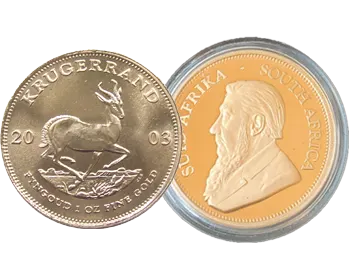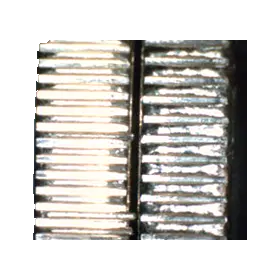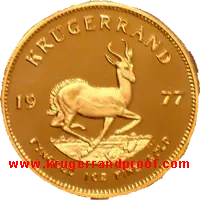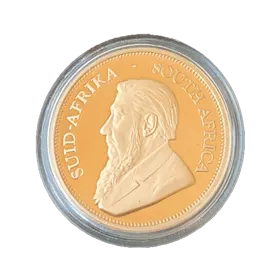
2003 UNC Bullion Krugerrand and a Proof Krugerrand.
1977 Proof Krugerrand
In 1977, identifying a Proof Krugerrand became much easier due to a key design change—the reeding became fine. There has been speculation regarding the exact number of serrations, but there is no need to count them. Instead, simply observe the following image to easily distinguish between the two types. The coin on the left is clearly the Proof Krugerrand.
In 1977, the SA Mint produced approximately 3 million Bullion Krugerrands. However, Proof Krugerrands were scarce, with only 8,500 minted. Some Proof Krugerrands in 1977 still featured coarse reeding, adding to their uniqueness.

Comparison of Proof Krugerrand fine reeding vs. coarse reeding on a Bullion Krugerrand.
1977 Proof Krugerrand in a SAM Presentation Box
All Proof Krugerrands should be accompanied by an SA Mint box, an SAGCE enclosure, or be certified and slabbed by NGC or another grading service. There were no Certificate of Origin (COA) documents issued for Proof Krugerrands in 1977.
Removing a Proof Krugerrand from its SA Mint box can be challenging. The best method is to gently cup your hand and slap the box into your cupped palm. Always handle a Proof Krugerrand with soft cotton gloves to avoid fingerprints or damage.
In the coming years, these early Proof Krugerrands will become extremely rare. Completing a full set will be increasingly difficult as collector demand rises.

How Much is a 1977 Proof Krugerrand Worth?
Since the value of bullion Krugerrands is closely tied to the price of gold, determining an exact price for a 1977 Proof Krugerrand can be difficult. However, a reasonable estimate is approximately 105% of the gold price.
| 1977 | Information |
|---|---|
| Hern's Number | K1 |
| Krause-Mishler Number | KM73 |
| Designer | CLS Coert Steynberg |
| Diameter | 32.61 to 32.77 mm |
| Thickness | 2.87 to 2.97 mm |
| Mintage (Proof) | 8,500 |
| Mintage (UNC/Bullion) | 3,000,000 |
| Total Weight | 33.9305 g |
| Gold Weight | 31.1 g (1 oz) |
| Gold Purity | 91.667% |
| Copper Content | 8.333% |
| Reeding | Coarse/Fine |
| Certificate of Origin | No |
| Frosted Features | Yes |
| Best Known Grade | PR69 |
